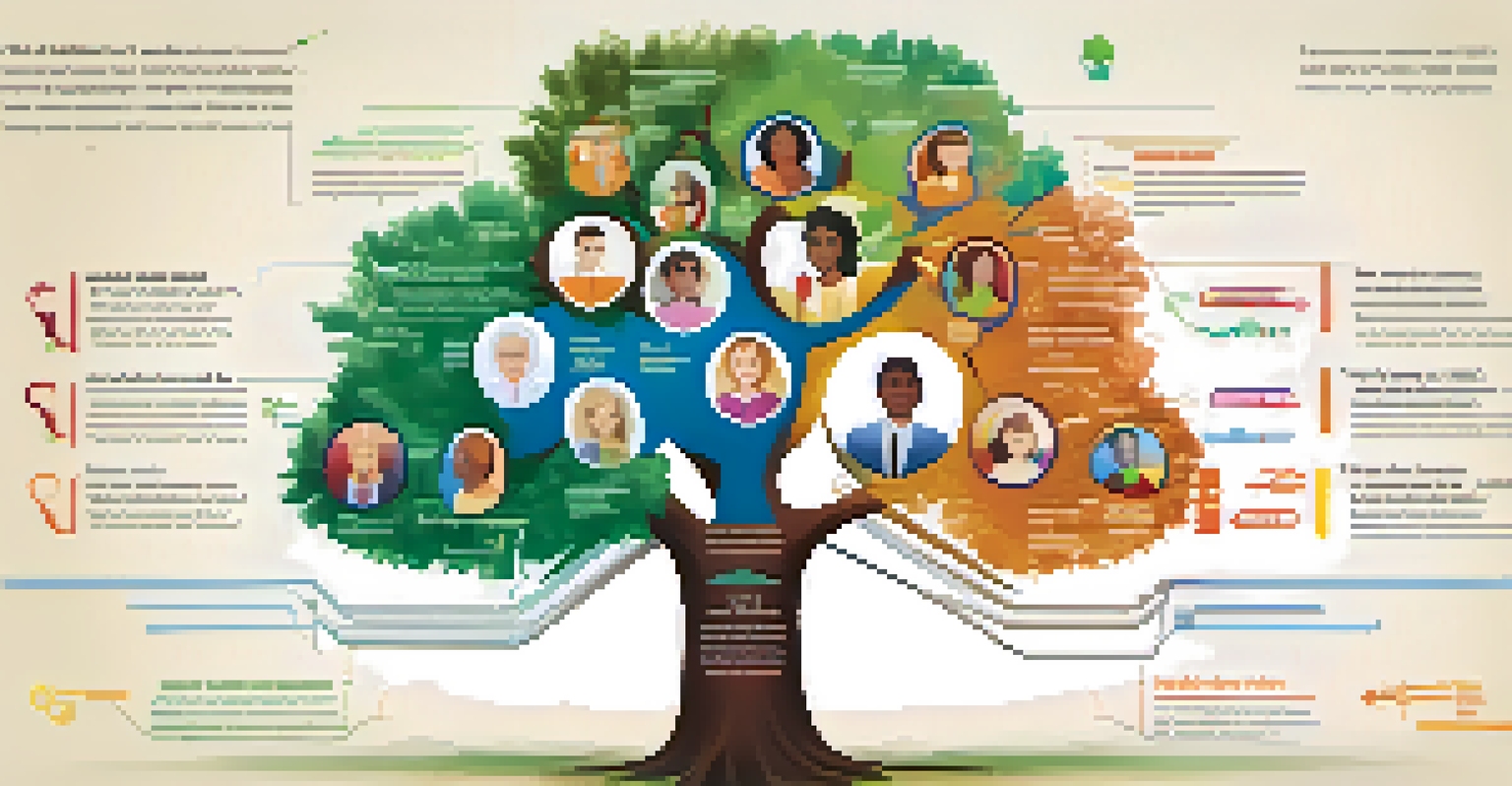The Importance of Family History in Genetic Risk Assessment

What is Family History and Why Does It Matter?
Family history refers to the health information about your relatives, including diseases and conditions that may run in the family. Understanding this information is crucial because certain genetic predispositions can be inherited, impacting your health. For instance, if multiple family members have had heart disease, it could suggest a genetic risk that you might share.
Knowing your family history is a powerful tool in understanding your health risks and making informed decisions.
By gathering details about your family's health, you can provide healthcare professionals with valuable insights. This information can guide them in assessing your own risk factors and in developing a personalized health plan. Think of it like piecing together a puzzle; the more pieces you have, the clearer the picture becomes.
Moreover, family history doesn’t just inform you about potential risks; it also empowers you to take proactive steps. With knowledge comes the ability to make lifestyle adjustments or seek early screenings, ultimately enhancing your overall health management.
The Genetic Connection: How Family History Works
Genetics play a significant role in the transmission of health risks from one generation to another. Specific genes can predispose certain individuals to diseases such as cancer, diabetes, or mental health disorders. Understanding how these genes are passed down through family lines can help identify who may be at risk.

For example, mutations in the BRCA1 and BRCA2 genes are linked to a higher risk of breast and ovarian cancers. If these mutations are present in your family, knowing this can lead to enhanced surveillance and preventive measures. It’s like having a roadmap that highlights areas where caution is needed.
Understanding Family Health Risks
Knowing your family's health history can reveal potential genetic risks that may impact your own health.
With advancements in genetic testing, individuals can now gain deeper insights into their family history. These tests can reveal genetic variants that may not show symptoms but could still pose risks, allowing for a more comprehensive approach to health.
The Role of Healthcare Providers in Risk Assessment
Healthcare providers play a crucial role in interpreting family history for genetic risk assessment. They can help you understand what specific conditions to look out for based on your family background. This collaboration can lead to tailored screening recommendations and preventive strategies.
Genetic testing can be a game changer in healthcare, providing insights that can save lives.
During consultations, providers often use tools like pedigree charts to visualize family health history. This clear representation helps identify patterns and potential genetic links, making it easier to spot risks. It’s similar to having a family tree that branches out into health conditions, providing a clearer view of your inherited risks.
Additionally, healthcare professionals can guide you through genetic testing options, empowering you with informed choices. This partnership not only enhances your understanding of your health but also fosters a proactive approach to wellness.
Identifying Patterns: Common Genetic Conditions
Certain conditions are known to have a strong hereditary component, including heart disease, diabetes, and various cancers. By identifying these patterns within your family, you can better understand your own health risks. For instance, if your family has a history of colon cancer, you may require earlier screening than the general population.
This recognition of patterns is essential in preventive healthcare. Knowing your family's health history enables you to discuss specific concerns with your doctor and stay ahead of potential issues. It’s like having a personal alert system that notifies you of possible health dangers.
Genetics and Lifestyle Interplay
While genetics influence health risks, lifestyle choices can mitigate these risks significantly.
Moreover, being aware of these common genetic conditions allows you to educate family members. Sharing this information can prompt discussions about health and wellness, creating a supportive environment where everyone is encouraged to prioritize their health.
The Impact of Lifestyle on Genetic Risks
While genetics play a significant role in health risks, lifestyle choices can also heavily influence outcomes. Factors such as diet, exercise, and smoking can either mitigate or exacerbate genetic predispositions. For example, someone with a family history of heart disease can greatly reduce their risk by maintaining a healthy lifestyle.
It’s important to remember that not all genetic risks are set in stone. Many people with a family history of certain conditions live healthy, active lives by making informed choices. It’s like having a safety net; even if you have a genetic risk, you can take steps to protect yourself.
Educating yourself about the interaction between genetics and lifestyle can empower you to make better decisions. By understanding that you have some control over your health, you can approach life with a proactive mindset.
Genetic Testing: A Tool for Informed Decisions
Genetic testing has become an invaluable tool in assessing genetic risks and informing healthcare decisions. These tests can provide specific insights into your genetic makeup, revealing potential vulnerabilities that may not be apparent through family history alone. It’s like taking a deep dive into your genetics to uncover hidden truths about your health.
However, it's essential to approach genetic testing with a clear understanding of its implications. Discussions with healthcare providers can help clarify what the results mean and how they can impact your health management. Think of it as having a conversation with a guide who can help you navigate the often complex waters of genetic information.
The Role of Genetic Testing
Genetic testing provides deeper insights into individual health vulnerabilities, empowering informed healthcare decisions.
Ultimately, genetic testing can empower you to make informed choices about your health. Whether it leads to preventive measures or lifestyle changes, the knowledge gained can be a game changer in your healthcare journey.
The Future of Family History in Genetics
As we look to the future, the integration of family history in genetic risk assessment is likely to become even more critical. Advances in technology and genetic research will provide broader insights into how our genes interact with our environment and lifestyle. This evolving understanding can help refine risk assessments and lead to more personalized healthcare.
Moreover, as awareness of the importance of family health history grows, more individuals are likely to engage in these conversations. Encouraging open discussions about health within families can foster a culture of proactive health management. It’s akin to passing down not just stories, but also health wisdom through generations.

In this way, family history will continue to be a cornerstone of genetic risk assessment, guiding individuals toward healthier futures. By embracing this knowledge, we can pave the way for a more informed and health-conscious society.